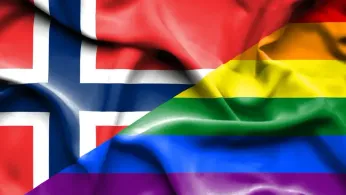
4 hours ago
Church of Norway Issues Historic Apology for Past Treatment of LGBTQ+ Community
READ TIME: 3 MIN.
In a landmark moment for both Norway’s religious and LGBTQ+ communities, the Church of Norway has publicly apologized for decades of discrimination, exclusion, and harm directed at lesbian, gay, bisexual, transgender, queer, and other sexual and gender minorities within its congregations. The apology, delivered on October 18, 2025, during a special session of the General Synod (Kirkemøtet) in Oslo, was immediately met with both relief and cautious optimism by LGBTQ+ advocates across the country .
Presiding Bishop Olav Fykse Tveit addressed the assembly, stating, “We acknowledge and deeply regret that the Church of Norway, through its words and actions, has caused pain, exclusion, and suffering to LGBTQ+ individuals and families. This is contrary to the Christian message of love and dignity for all people” . The bishop’s statement was greeted with a standing ovation by delegates and guests, including several prominent LGBTQ+ activists.
The apology comes after years of advocacy from within the church, as well as mounting public pressure following recent reports on the impact of religious exclusion on mental health and well-being among LGBTQ+ Norwegians .
The Church of Norway, the country’s largest Christian denomination, has had a complex relationship with the LGBTQ+ community. For much of the 20th century, church doctrine opposed same-sex relationships, and LGBTQ+ individuals faced exclusion from full participation in church life, including denial of marriage and ordination .
In 2017, the church voted to allow same-sex couples to marry in church ceremonies, a move widely regarded as a turning point . However, many activists pointed out that the church’s formal doctrines and practices continued to cause harm, and they called for a full apology and measures to address past injustices.
The apology followed a comprehensive review conducted by a church-appointed commission, which heard testimony from hundreds of LGBTQ+ members, clergy, and allies. The commission’s report, published in September 2025, catalogued stories of exclusion, bullying, forced “conversion” attempts, and long-term psychological distress attributed to the church’s teachings .
The commission recommended not only an apology but also concrete steps to ensure greater inclusion, including anti-discrimination training for clergy, support for LGBTQ+ youth, and the establishment of an independent ombudsperson for LGBTQ+ church members .
The apology was welcomed by LGBTQ+ organizations and advocates, who described it as a long-overdue step towards healing. In a statement, Fri – the Norwegian Organization for Sexual and Gender Diversity, said, “This apology gives voice to the pain endured by generations of LGBTQ+ people in religious settings. We hope it marks the beginning of a new era of inclusion and respect” .
Transgender activist and theologian Tale Haugland, who helped organize testimony for the commission, commented, “Acknowledging the harm done is essential, but we will be watching to ensure that words are matched by action—especially for transgender and non-binary people, who have often been most marginalized” .
Many church leaders expressed hope that the apology would help restore trust between the church and LGBTQ+ Norwegians. Reverend Anne Lise Ådnøy, bishop of Stavanger, stated, “We are called to love our neighbor, and that includes all people, regardless of who they love or how they identify. Today we take a step closer to living out that calling” . Some conservative members voiced reservations but agreed that open dialogue was essential.
The Church of Norway’s statement is part of a broader shift among European Protestant denominations, several of which have recently moved to apologize for or reconsider their positions towards LGBTQ+ people. The Church of Sweden issued a similar apology in 2022, and the Evangelical Church in Germany has also begun the process of reviewing its past actions .
Alongside the apology, the Church of Norway outlined a series of commitments, including:
- Developing education and support resources for LGBTQ+ youth within church programs
- Creating a permanent advisory council of LGBTQ+ members and allies
- Ensuring all clergy receive training on LGBTQ+ inclusion and anti-discrimination policies
- Establishing an independent ombudsperson to address complaints related to discrimination within church settings
Church leaders have pledged to review progress annually and publish updates for public accountability.
The Church of Norway’s apology is being closely watched by other faith communities and LGBTQ+ advocates worldwide. International organizations, including the Human Rights Campaign and ILGA-Europe, praised the move as an example of institutional accountability and reconciliation .
The coming months will test the church’s resolve to turn its apology into meaningful change. As Bishop Tveit concluded in his address, “Let this be not an end, but a beginning—a renewed commitment to justice, compassion, and the full inclusion of all God’s children” .






